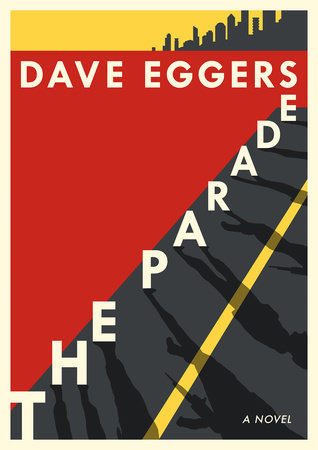(THIS ARTICLE IS MACHINE TRANSLATED by Google from Norwegian)
Dave Eggers' latest novel has a rather prosaic starting point: Two entrepreneurs employed by a multinational company are to pave a long road in an unknown country, probably somewhere in Africa, a country recently ravaged by a protracted civil war. The road will connect the poor south with the capital in the north, and the new road strip is intended to support the new and fragile peace, while at the same time repairing and modernizing both road networks and infrastructure.
For security reasons, they have two anonymous names and countries of origin and work in double teams; Four operates the state-of-the-art machine, while Assistant Nine drives in front of him on an ATV to keep track of and repair any damage and obstacles on the roadway. The contrast between the two men is great: Four is conscientious, rational, and adheres to the tight schedule of cold and consistent fanaticism.

Nine, on the other hand, is quite fresh in the industry, and he roams the landscape of the ATV, stopping to talk and get to know the locals, and he also disappears into the terrain for long periods of time and annoys the wits of Four because he doesn't follow the mission to the point. Four call Nine "a maker of chaos".
contrasts
As two representatives of Western aid, Four and Nine also represent two completely different types of people. Four stays away from the locals, both for safety reasons and because he thus adheres to the schedule – and can also remain in the comfort zone: in the cab of the paving machine.
Outside the cab, the situation is uncertain, unpredictable and partly chaotic, as rebel soldiers still operate in the area and have often kidnapped aid personnel.
Nine, on the other hand, takes chances, he risks constantly getting into trouble and trouble – he goes to the local dungeons, drinks with the men and lies with the ladies, speaks the local language and comes quickly inside the poor environment they pass through. He also believes that they bring prosperity and development with the new road, that the small communities along the stretch of the paved road will flourish as traffic picks up between the capital of the north and the poor areas to the south.
Four, for his part, has only selfish motives, he makes good money on a short and demanding mission in a country he does not know and will not get to know. When the job is done, he returns home to the family somewhere north of the equator to wait for the next mission in yet another unknown, war-ravaged country.
conflicts
The fact that Eggers does not use a specific country or continent as the backdrop for the novel really reinforces the story itself, and it also helps that Four and Nine have anonymous names and homelands. Both seem nonetheless American, but not overly American, they also differ so much from each other that the fundamental differences between them build up during the conflict in the narrative.
Four is the prototype of a white man from a prosperous, western country trying to keep his comfort zone intact no matter what is going on around him, even in a war-ravaged area where everything lies in gravel.
The narrator voice also closely follows Four, who looks, feels and thinks like him; the tight language is both sober, economical and aggressive, and stylistically it is very similar to both John Maxwell Coetzee and VS Naipaul.
Thematically, there are similarities to these two nestors: Four is the prototype of a white man from a prosperous, western country who tries to keep his comfort zone intact no matter what is going on around him, even in a war-torn area where everything lies in gravel. The vast, open and desolate landscape he traverses poses a potential threat; rebel soldiers and bandits can appear and kidnap him at any time, and his mentality is reminiscent of a lonely wildebeest running across a plain hoping that the nearby lions do not detect him.
Four is not there to experience or learn, nor to give his moral support to the rebuilding of a war-ravaged society; he does not even conduct anything similar to a civilization project. He is there on behalf of a global and cash-strapped client who sends his contractors across the globe to carry out repairs and improvements to damaged or outdated infrastructure, and often for corrupt and authoritarian regimes that pay well. Thus, Four acts as a kind of archetype for an armada of indifferent world citizens. They do not do the good, and what they do, they only do for good money.
Nine, in turn, symbolizes an alternative, a naivism that is just as basic and therefore equally archetypal.
Like the good, well-meaning from the West, he wants to lift people out of poverty and distress and right into the 21st century – by giving them the country's first paved highway. In this well-intentioned intention is also hidden a globalization idea, an inclusion in the global economy, but it is more about prosperity than about profit hunting, ie as a measure for the community and not for an already rich and privileged upper class in an otherwise poor and underdeveloped country. .
In just under 180 pages, Dave Eggers manages to present both surprisingly good writing and a lot of classic dilemmas that are quickly encountered in today's globalized world.






